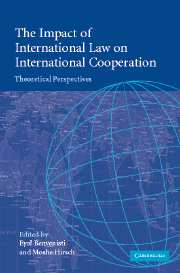Book contents
- Frontmatter
- Contents
- List of contributors
- Acknowledgments
- List of abbreviations
- 1 Introduction
- 2 International law and international relations theory: a prospectus
- 3 Pathways to international cooperation
- 4 Customary international law as a judicial tool for promoting efficiency
- 5 Reputation, compliance and development
- 6 Rethinking compliance with international law
- 7 Compliance with international norms in the age of globalization: two theoretical perspectives
- 8 Compliance and non-compliance with international norms in territorial disputes: the Latin American record of arbitrations
- 9 International trade and domestic politics: the domestic sources of international trade agreements and institutions
- 10 Human rights, developing countries and the WTO constraint: the very thing that makes you rich makes me poor?
- 11 Back to court after Shrimp–Turtle: India's challenge to labor and environmental linkages in the EC generalized system of preferences
- Index
10 - Human rights, developing countries and the WTO constraint: the very thing that makes you rich makes me poor?
Published online by Cambridge University Press: 06 July 2009
- Frontmatter
- Contents
- List of contributors
- Acknowledgments
- List of abbreviations
- 1 Introduction
- 2 International law and international relations theory: a prospectus
- 3 Pathways to international cooperation
- 4 Customary international law as a judicial tool for promoting efficiency
- 5 Reputation, compliance and development
- 6 Rethinking compliance with international law
- 7 Compliance with international norms in the age of globalization: two theoretical perspectives
- 8 Compliance and non-compliance with international norms in territorial disputes: the Latin American record of arbitrations
- 9 International trade and domestic politics: the domestic sources of international trade agreements and institutions
- 10 Human rights, developing countries and the WTO constraint: the very thing that makes you rich makes me poor?
- 11 Back to court after Shrimp–Turtle: India's challenge to labor and environmental linkages in the EC generalized system of preferences
- Index
Summary
The issue
This chapter focuses on the question whether and, if yes, to what extent, participation in the WTO imposes on its members, and in particular, members with a status of developing country, a certain level of human rights protection.
First, I aim to show that the WTO, with one notable exception (the Agreement on the Protection of Intellectual Property Rights (TRIPS)), is essentially an instrument of negative integration that does not prejudge the level of human rights protection. Indeed, one could go so far and state that the WTO contract per se does not prejudge regulatory intervention in the field of human rights at all: the only element of positive integration in the field of human rights protection is in fact provided by general public international law which makes it clear (Articles 53 and 64 of the Vienna Convention on the Law of Treaties) that states cannot, through conventional means, undo their obligation to respect jus cogens erga omnes.
Hence, the question has to be reformulated in the following manner: does participation in the WTO, an agreement which aims, in principle at least, at compensating the most efficient source of production, amount to a race-to-the-bottom when it comes to protection of human rights? My response is that one can construct theoretical examples that respond either positively or negatively to the stated questions.
- Type
- Chapter
- Information
- The Impact of International Law on International CooperationTheoretical Perspectives, pp. 244 - 260Publisher: Cambridge University PressPrint publication year: 2004

